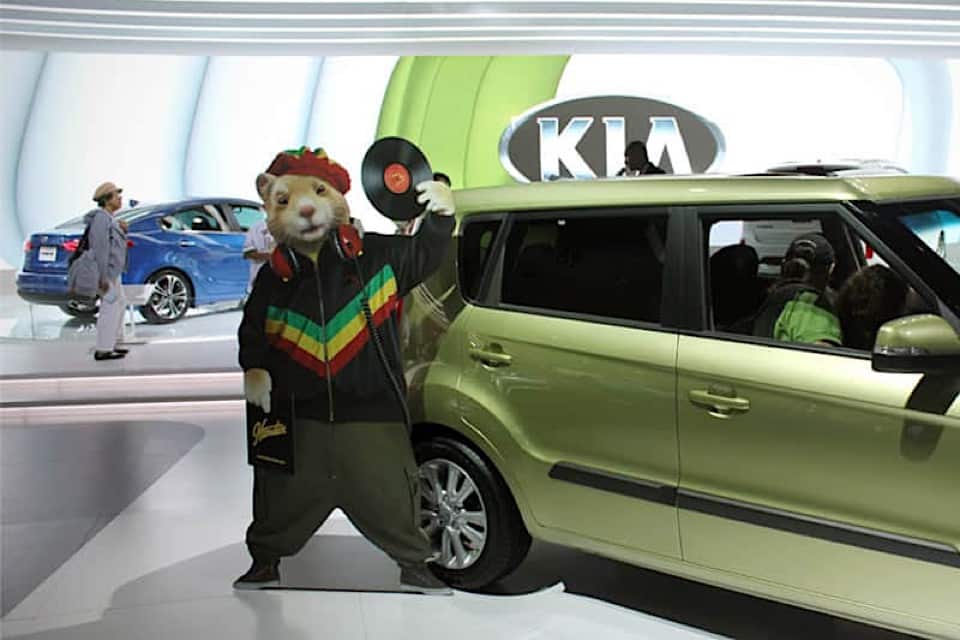Rodents Love Kia's Soy Wires. Now the Ads Make Sense.
- Kia uses a soy-based electrical wire coating that is cheaper and more environmentally friendly.
- It also tends to attract rodents that love the material for nest building.
- Prevention options are usually weird and range from coyote pee to capsaicin-laced tape.

Rodents just can't resist the soy-derived wire coatings used in Kia vehicles. The chewed up wires are costing owners hundreds, and sometimes thousands of dollars in repairs. However, this isn't a Kia-only problem. The most obvious benefit of coating wires in soy-based materials is it results in less plastic in the landfill or oceans. That’s a good thing!
But the coatings are a perfect chew toy for rodents, provide excellent nesting material, are are found in near endless supply in a warm, hidden spot. If you’re a mouse, it’s the greatest thing ever. But if you’re an owner waking up to a severed fuel line, it’s a little less enjoyable
Kia is not the only one to make this switch or deal with the rodent-problem ∞
In January 2016, a lawsuit filed against Honda claimed the soy-based wiring was irresistible to rabbits. Later that year, a similar lawsuit was filed against Toyota. Both Subaru and Hyundai are also facing similar lawsuits.
Generations Where This Problem Has Been Reported
This problem has popped up in the following Kia generations.
Most years within a generation share the same parts and manufacturing process. You can also expect them to share the same problems. So while it may not be a problem in every year yet, it's worth looking out for.
1st Generation Cadenza
- Years
- 2014–2016
- Reliability
- 26th out of 42
- PainRank™
- 4.01
- Complaints
- 34
1st Generation Forte
- Years
- 2010–2014
- Reliability
- 38th out of 42
- PainRank™
- 11.61
- Complaints
- 131
2nd Generation Forte
- Years
- 2015–2020
- Reliability
- 19th out of 42
- PainRank™
- 2.85
- Complaints
- 44
3rd Generation Optima
- Years
- 2011–2015
- Reliability
- 41st out of 42
- PainRank™
- 34.37
- Complaints
- 415
4th Generation Optima
- Years
- 2016–2020
- Reliability
- 14th out of 42
- PainRank™
- 2.25
- Complaints
- 36
3rd Generation Rio
- Years
- 2012–2017
- Reliability
- 25th out of 42
- PainRank™
- 3.25
- Complaints
- 46
3rd Generation Sedona
- Years
- 2015–2020
- Reliability
- 20th out of 42
- PainRank™
- 2.88
- Complaints
- 35
2nd Generation Sorento
- Years
- 2011–2014
- Reliability
- 42nd out of 42
- PainRank™
- 35.31
- Complaints
- 499
3rd Generation Sorento
- Years
- 2015–2020
- Reliability
- 40th out of 42
- PainRank™
- 13.09
- Complaints
- 146
1st Generation Soul
- Years
- 2010–2013
- Reliability
- 39th out of 42
- PainRank™
- 12.63
- Complaints
- 122
2nd Generation Soul
- Years
- 2014–2019
- Reliability
- 36th out of 42
- PainRank™
- 8.6
- Complaints
- 141
3rd Generation Sportage
- Years
- 2011–2015
- Reliability
- 37th out of 42
- PainRank™
- 9.64
- Complaints
- 95
4th Generation Sportage
- Years
- 2016–2020
- Reliability
- 23rd out of 42
- PainRank™
- 3.11
- Complaints
- 26
Further Reading
A timeline of stories related to this problem. We try to boil these stories down to the most important bits so you can quickly see where things stand. Interested in getting these stories in an email? Signup for free email alerts for your vehicle over at CarComplaints.com.
One Kia owner has had enough of gnawed wires leading to dashboard warning lights and multiple calls to the insurance company.
Tsvetelin Tsonev filed a class-action lawsuit because his 2015 Soul is being used like a chew toy.
The plaintiff says he leased a 2015 Kia Soul in April 2015 that has allegedly been damaged three times because the automaker keeps replacing soy-based wiring with more soy wiring, inviting more critters to snacktime.
OK, so it turns out rodents don’t really snack on the coating, but they do love chewing on it and making nests out of it.
And if you’re wondering just how much damage a rodent could do, brace yourself.…
keep reading article "Soy Wires are Still Being Chewed Up. Maybe Kia Should Stop Advertising with Rodents."Another day, another manufacturer getting sued for using soy-based wire coating.
Plaintiff Campbell claims her 2014 Kia Optima was damaged in December 2016 when rodents chewed the wire harness and wiring. Campbell asked Kia to cover the repairs under warranty but after allegedly making her wait almost a month with the Kia Optima sitting at the dealership, Kia denied her claim for coverage.
This is not a Kia-only problem. Other automakers have made the switch to a soy-based wire coatings and are facing similar lawsuits including Honda, Toyota, Hyundai, and Subaru.
The lawsuit covers owners or lessees in California, Texas, and NJ with most of the 2012-2017 Kia lineup.
keep reading article "Kia Sued for Using A Soy-Based Wire Coating"